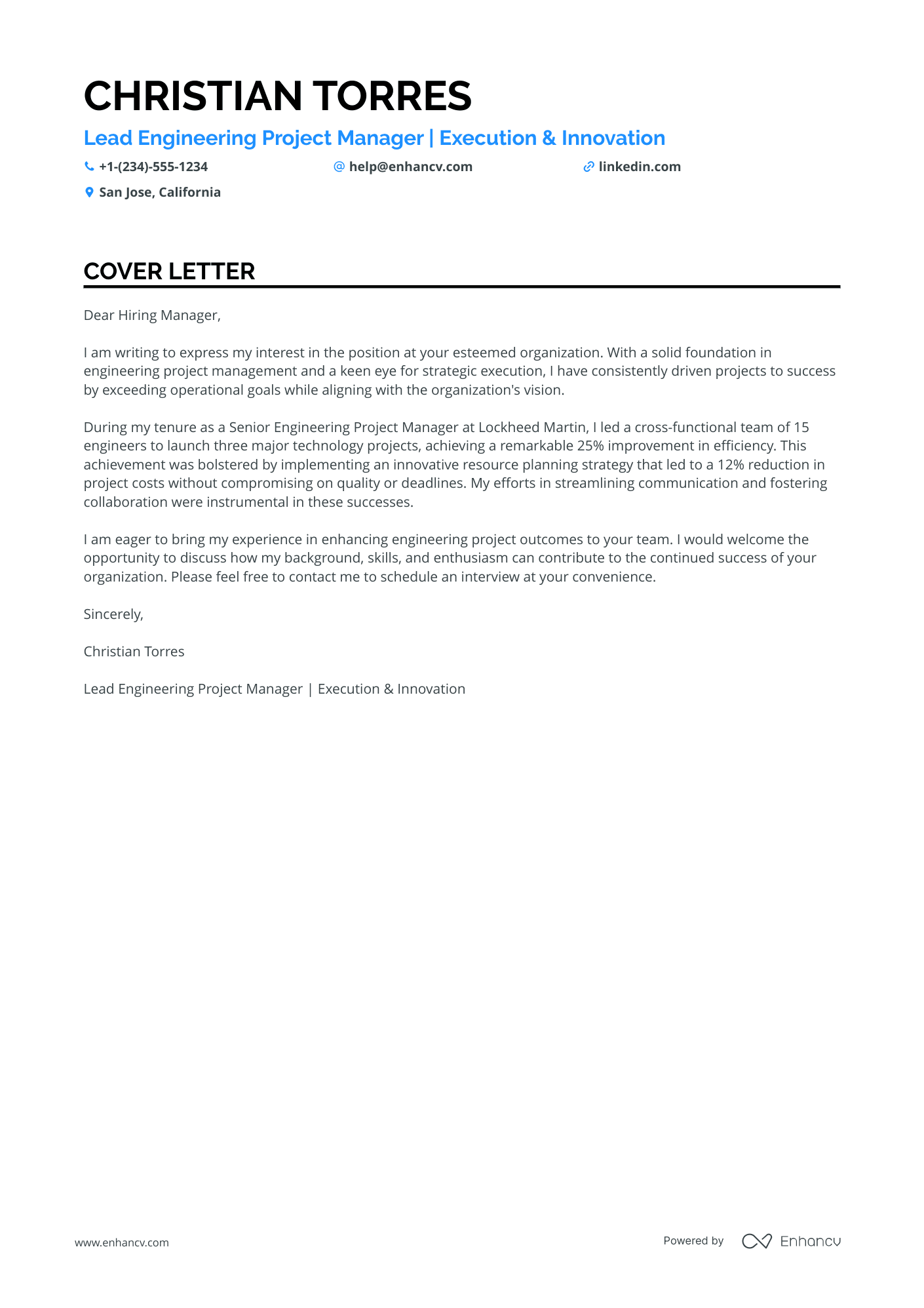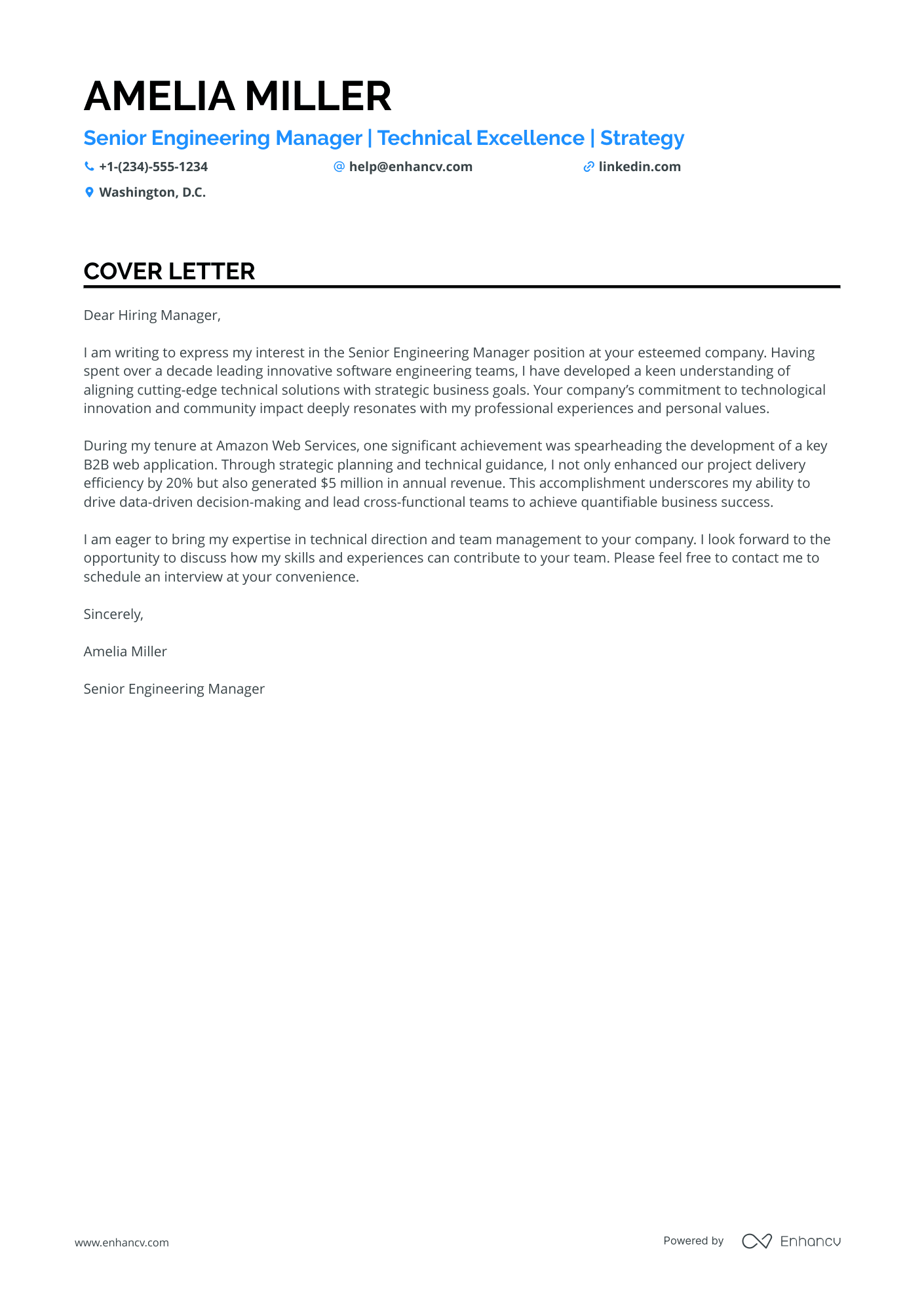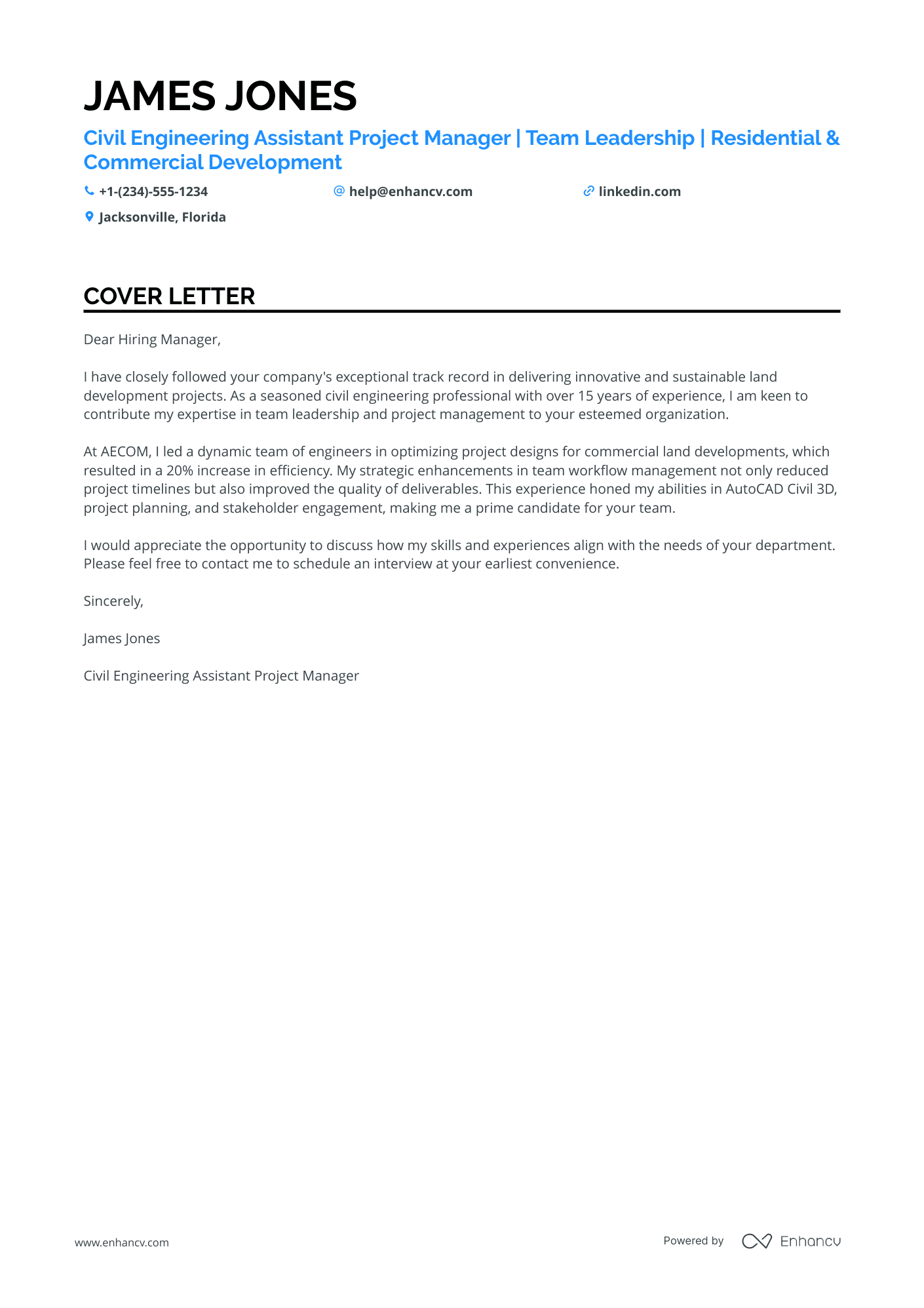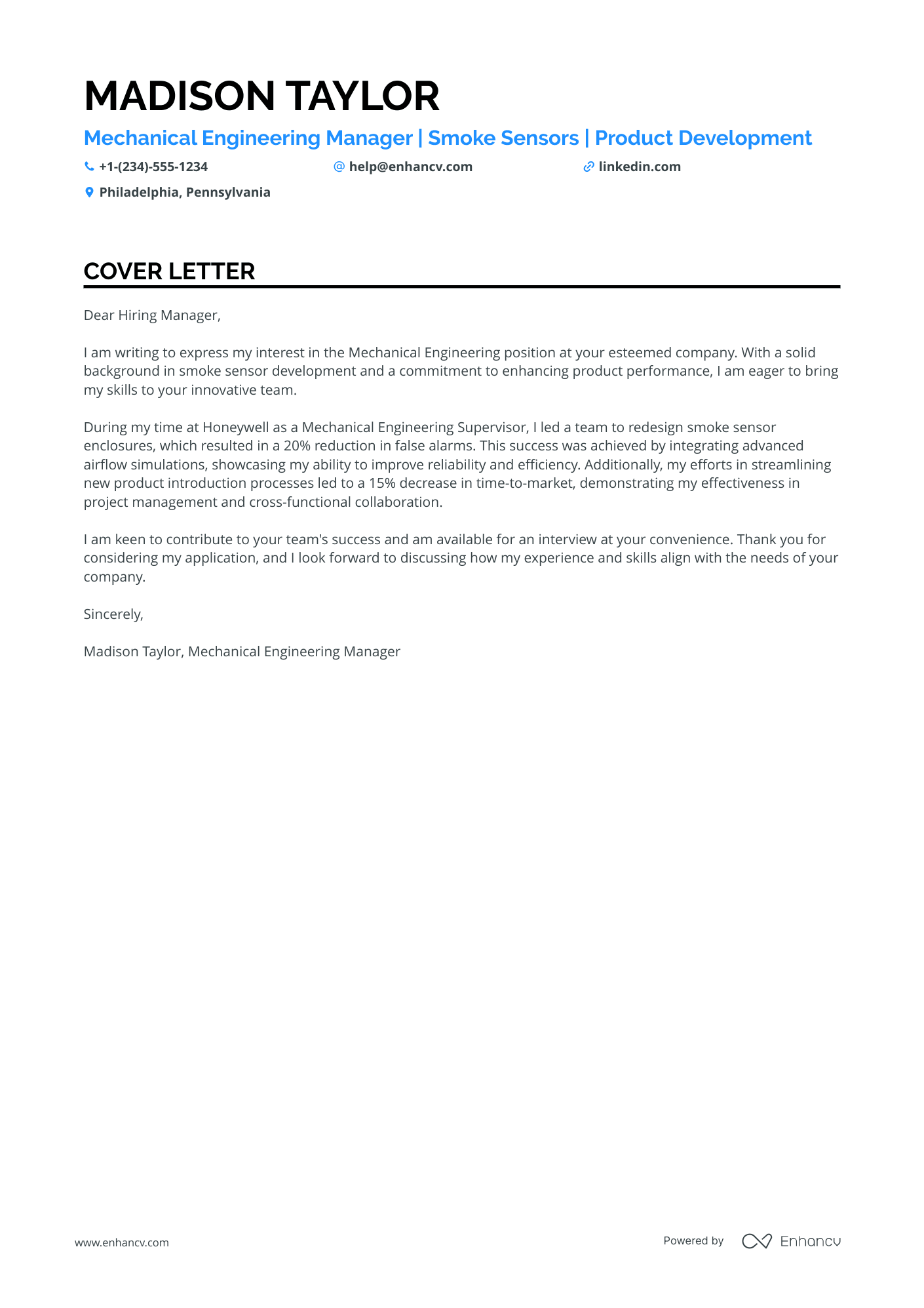Embarking on the job hunt, you've found the ideal engineering manager position and crafted a sharp resume, only to realize a compelling cover letter is also required. Avoid the trap of simply rehashing your resume; your cover letter needs to weave a narrative around your proudest professional moment. Striking the balance between formal tone and fresh prose, steer clear of clichés and keep it concise—no more than a single page. Let's hone your storytelling to make that engineering manager role yours.
- Step your best foot forward in the engineering manager cover letter introduction;
- Be inspired by other professionals' certified cover letters;
- Structure your engineering manager cover letter to feature what matters most;
- Close off your engineering manager cover letter to make a memorable impression on recruiters.
But where to start writing? Upload your resume into Enhancv's AI, which will prepare your engineering manager cover letter (all you need to do is personalize it, and you'll be good to go).
If the engineering manager isn't exactly the one you're looking for we have a plethora of cover letter examples for jobs like this one:
- Engineering Manager resume guide and example
- Project Engineer cover letter example
- Construction Worker cover letter example
- Energy Manager cover letter example
- Biomedical Engineer cover letter example
- Engineering Program Manager cover letter example
- Landscape Architect cover letter example
- Industrial Engineer cover letter example
- Structural Engineer cover letter example
- Audio Engineer cover letter example
- Systems Engineer cover letter example
Drop your resume here or choose a file.
PDF & DOCX only. Max 2MB file size.
Engineering manager cover letter example
Charlotte May
Chicago, IL
+1-(234)-555-1234
help@enhancv.com
- Highlighting Professional Achievements: Mentioning the successful launch of a web-based application with significant user reach and revenue generation grabs attention by quantifying accomplishments.
- Emphasizing Leadership and Collaboration Skills: Outlining the candidate's experience in leading a team and working across departments showcases essential soft skills for an Engineering Manager role at INTEL.
- Demonstrating Technical and Strategic Acumen: Discussing the adaptation of DevOps practices and the delivery of high-quality digital products reflects an understanding of both strategic planning and technical execution relevant to INTEL's work.
The format of your engineering manager cover letter: structure, fonts, margins, and more
Your engineering manager cover letter should include a header (with your name, position, and date); a greeting and introductory paragraph; a body and closing paragraphs; and an optional signature.
Remember that you're writing your engineering manager cover letter for recruiters - as the Applicant Tracker System won't scan this content.
Here are a few more tips and tricks to keep in mind when formatting your engineering manager cover letter:
- Use the same font in your engineering manager cover letter and resume. We recommend modern fonts, e.g. Lato and Rubik, to help you stand out, instead of the stereotypical Arial and Times New Roman.
- Each paragraph should have single spacing, which is already set up for you in our cover letter templates.
- Our cover letter builder follows industry standards for your engineering manager cover letter formatting - with a one-inch margin, surrounding your content.
- Always export your engineering manager cover letter in PDF to ensure the image or text quality stays the same and your writing isn't moved about.
Let us save you time! With our free cover letter generator, you can create a professional letter instantly using your resume.
The top sections on a engineering manager cover letter
- Header with Contact Information: This section is essential for providing the recruiter with your name, address, phone number, and email, making it easy for them to contact you for further discussion or to schedule an interview.
- Opening Greeting: A personalized greeting addresses the hiring manager by name, demonstrating your attention to detail and interest in establishing a professional connection.
- Introduction: This opening paragraph should clearly state the engineering management position you’re applying for and include a compelling hook that presents your unique value proposition and leadership experience in the engineering field.
- Body: Highlight specific examples of your engineering projects, leadership skills, team-building successes, and how you’ve managed budgets and timelines, which are key areas of responsibility for an engineering manager.
- Closing Section: Conclude with a strong and proactive closing that reiterates your enthusiasm for the role, mentions your availability to discuss how you can contribute to the company, and includes a thank you to the recruiter for considering your application.
Key qualities recruiters search for in a candidate’s cover letter
Experienced in project management methodologies (e.g., Agile, Scrum, Waterfall): This shows that the candidate can effectively plan, execute, and oversee projects from start to finish, utilizing industry-standard approaches.
Proven leadership in leading diverse engineering teams: Demonstrates the ability to manage, inspire, and direct engineers with different specializations and backgrounds towards common goals.
Strong technical expertise in relevant engineering domains: Highlights that the candidate is abreast with the technical challenges and can command respect and provide guidance based on their own engineering experience.
History of successful product development and launches: Shows that the candidate can take products from conceptualization through to market launch, which is a core part of an engineering manager's job.
Excellent communication and interpersonal skills: Essential for effectively conveying visions, aligning teams, negotiating with stakeholders, and articulating technical concepts to non-technical colleagues.
Financial acumen and budget management experience: Critical because engineering managers often oversee budgets and must be adept at cost optimization and resource allocation.
How to greet recruiters in your engineering manager cover letter salutation
As the saying goes, "You never get a second chance to make a first impression."
Write your engineering manager cover letter salutation to be more personalized to the actual hiring manager, who is set to assess your profile by:
- greeting them on a first-name basis, if you have previously communicated with them (e.g. "Dear Sam,");
- using their last name, if you have more formal communication or haven't spoken to them (e.g. "Dear Mr. Harrows" or "Dear Ms. Marshall");
- writing "Dear HR Team" or "Dear Hiring Manager", if you have no clue about who's recruiting for the role.
Search on LinkedIn, Google, or the company website to find information as to the recruiter's name.
In any case, avoid the impersonal "Dear Sir or Madam".
List of salutations you can use
- Dear Hiring Manager,
- Dear [Company Name] Team,
- Dear [Department] Department,
- Dear [Mr./Ms. Last Name],
- Dear [Job Title] Search Committee,
First introductions in your engineering manager cover letter
Within your engineering manager cover letter introduction, genuinely state what you like about the organization.
Research the latest company projects, honorary awards, company updates, etc.
Write up to two sentences to let recruiters know what impresses you about the company,
This would help you to set a good tone for the rest of the communication.
What to write in the body of your engineering manager cover letter
Now that you've got your intro covered, here comes the heart and soul of your engineering manager cover letter.
It's time to write the middle or body paragraphs. This is the space where you talk about your relevant talent in terms of hard skills (or technologies) and soft (or people and communication) skills.
Keep in mind that the cover letter has a different purpose from your engineering manager resume.
Yes, you still have to be able to show recruiters what makes your experience unique (and applicable) to the role.
But, instead of just listing skills, aim to tell a story of your one, greatest accomplishment.
Select your achievement that:
- covers job-crucial skills;
- can be measured with tangible metrics;
- shows you in the best light.
Use the next three to six paragraphs to detail what this success has taught you, and also to sell your profile.
Closing remarks to end your engineering manager cover letter
Of course, you'll have to show gratitude to the recruiters, who have assessed your profile at the end of your engineering manager cover letter .
A "Thank you for the consideration" would work wonders, instead of the standard "Sincerely yours".
Do you want to make an even better impression?
Close off your engineering manager cover letter by promising how you see yourself excelling in the role and the positive impact you'd bring about.
A sentence that encourages some further action on the recruiter's end could also be a good way to close off the communication (e.g. provide your availability for an interview).
No experience engineering manager cover letter: making the most out of your profile
Candidates who happen to have no professional experience use their engineering manager cover letter to stand out.
Instead of focusing on a professional achievement, aim to quantify all the relevant, transferrable skills from your life experience.
Once again, the best practice to do so would be to select an accomplishment - from your whole career history.
Another option would be to plan out your career goals and objectives: how do you see yourself growing, as a professional, in the next five years, thanks to this opportunity?
Be precise and concise about your dreams, and align them with the company vision.
Key takeaways
Winning at your job application game starts with a clear and concise engineering manager cover letter that:
- Has single-spaced paragraphs, is wrapped in a one-inch margin, and uses the same font as the engineering manager resume;
- Is personalized to the recruiter (using their name in the greeting) and the role (focusing on your one key achievement that answers job requirements);
- Includes an introduction that helps you stand out and show what value you'd bring to the company;
- Substitutes your lack of experience with an outside-of-work success, that has taught you valuable skills;
- Ends with a call for follow-up or hints at how you'd improve the organization, team, or role.
Engineering Manager cover letter examples
By Experience
Lead Engineering Manager
- Specific Achievements: The cover letter cites specific achievements, such as leading a team and improving efficiency by 25%, which showcases the candidate's capability in effectively managing projects and driving tangible results.
- Cost Management Skills: Highlighting a 12% reduction in project costs without sacrificing quality or deadlines underscores the candidate's strategic planning and resource management expertise, crucial for an engineering project management role.
- Team Leadership: Leading a cross-functional team aligns with essential leadership and communication skills needed for a Senior Engineering Project Manager, demonstrating the ability to manage diverse groups towards a common goal.
- Alignment with Organizational Goals: Articulating how past experiences align with the company's vision shows that the candidate not only understands but is also committed to contributing to the organization’s objectives.
Senior Engineering Manager
- Alignment with Company Values: The letter articulates a strong connection between the candidate’s values and those of the company, demonstrating cultural fit which is crucial for leadership roles.
- Quantifiable Achievements: The candidate provides specific metrics (e.g., enhancing delivery efficiency by 20% and generating $5 million revenue) to underscore their impact, which is essential for roles that demand a data-driven approach.
- Leadership and Team Management Experience: Highlighting past experiences such as leading cross-functional teams, which is particularly relevant in a senior engineering management position.
- Direct Call to Action: The letter ends with a proactive invitation to discuss how the candidate's skills can benefit the company, encouraging the hiring manager to engage further.
By Role
Civil Engineering Project Manager
- Highlighting specific achievements: The cover letter effectively mentions a tangible achievement, such as a 20% increase in efficiency at AECOM, showcasing the candidate's ability to contribute positively to the company's performance.
- Emphasizing relevant skills: The letter references proficiency in AutoCAD Civil 3D, a key software used in civil engineering, underscoring the candidate's technical capability that is essential for this role.
- Project management experience: By discussing past leadership in project design optimization and workflow management, the letter demonstrates the candidate's capacity for managing complex projects, which is crucial for an assistant project manager role.
- Aligning with company values: The letter acknowledges the company's focus on innovation and sustainability, indicating the candidate's understanding of and alignment with the organization's objectives.
Mechanical Engineering Manager
- Highlight specific achievements related to the role, such as the redesign of smoke sensor enclosures that led to a significant reduction in false alarms, which demonstrates problem-solving and technical expertise.
- Emphasize leadership skills by mentioning supervisory roles and successful team management, such as leading a team to streamline new product introduction processes.
- Include quantitative results to showcase impact, like a 20% reduction in false alarms and a 15% decrease in time-to-market, to provide concrete evidence of effectiveness.
- Show commitment to the industry and innovation by expressing eagerness to join an esteemed company and contribute to its success.













